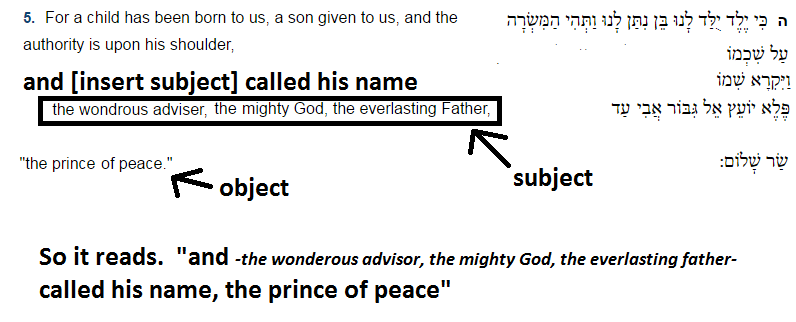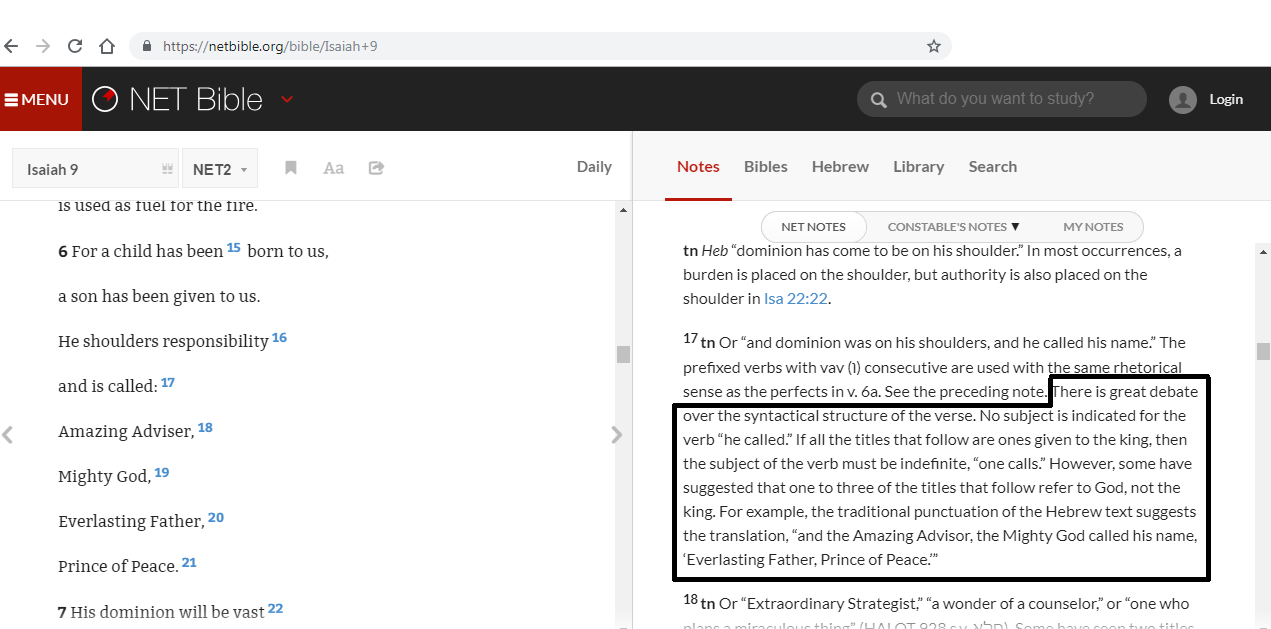Rashi (and similarly other Jewish commentaries) explains the meaning of this verse very differently from the Christian translation from which you ask your question, and hence your question does not begin:
and… called his name: The Holy One, blessed be He, Who gives wondrous counsel, is a mighty God and an everlasting Father, called Hezekiah’s name, “the prince of peace,” since peace and truth will be in his days.
Thus according to Rashi and others, the correct translation of the verse is:
For a child has been born to us, a son given to us, and the authority is upon his shoulder, and the wondrous adviser, the mighty God, the everlasting Father, called his name, "the prince of peace."
Translation of the verse and Rashi are quoted from here.
added by barlop

The translation that rashi gives(which isn't used by the JPS), is that the hebrew is written using verb, subject, object. Rather like and god called/named light 'day' is not and he called god .. So vayikra shmoh tony, could be "and he called his name tony", or it could be "and tony called his name". So vayikra is not always translated 'and he called' it can be that the subject comes one or two words later.
So to put it another way, the translation that rashi gives, is structured like this. Verb subject object, which is very common in hebrew.

The NET (New English Translation) is a christian translation but is academic and has lots of translation notes that discuss both translations re structure, and also re tense of "born".
For tense, the JPS has "a child is born". e.g. https://www.mechon-mamre.org/p/pt/pt1009.htm " For a child is born unto us, a son is given unto us; and the government is upon his shoulder; and his name is called Pele-joez-el-gibbor-Abi-ad-sar-shalom;"
The NET has "a child has been born" (i.e. past tense), and the word is past tense. Though the NET also notes, that "The Hebrew perfect (translated “has been born” and “has been given”) is used here as the prophet takes a rhetorical stance in the future. See the note at 9:1." So the NET commentary is saying that as in 9:1 a prophet can use the past tense as a rhetorical device. We do that in English, if somebody can see their impending death, they might say "we are dead", when they're not dead yet. In the mind of a prophet, the future has already happened. So there is such a thing as the "prophetic perfect". A word written in the "perfect" as in, completed, but that hasn't happened yet.
The word Vayikra is translated by the JPS 1917 in the present "and his name is called" and JPS 1985, in the past "and he has been named". The NET says "is called", and notes that "vav consecutive are used with the same rhetorical sense as the perfects". There doesn't seem to be such a term as prophetic imperfect but I guess that's what the the NET translation is effectively saying it is.

NET translation notes state-
There is great debate over the syntactical structure of the verse. No
subject is indicated for the verb “he called.” If all the titles that
follow are ones given to the king, then the subject of the verb must
be indefinite, “one calls.” However, some have suggested that one to
three of the titles that follow refer to God, not the king. For
example, the traditional punctuation of the Hebrew text suggests the
translation, “and the Amazing Advisor, the Mighty God called his name,
‘Everlasting Father, Prince of Peace.’”
The JPS 1917 and JPS 1985 use a translation with a structure that doesn't follow rashi / the traditional punctuation.
JPS 1917 https://www.mechon-mamre.org/p/pt/pt1009.htm
JPS 1985 https://www.sefaria.org/Isaiah.9?lang=bi
Translation on chabad.org, translated by Rabbi A.J. Rosenberg. And includes Rashi with translation of Rashi https://www.chabad.org/library/bible_cdo/aid/15940/jewish/Chapter-9.htm
added by nissimnanach
Thus Rashi renders it the same as Targum Yonatan where only the last two names, Sar Shalom, Prince of Peace, apply to Messiah's name:
אמר נביא לבית דוד ארי רבי איתילד לנא בר אתיהב לנא וקבל אוריתא עלוהי למטרה ואתקרי שמיה מן קדם מפליא עצה אלהא גברא קים לעלמיא משיחא דשלמא יסגי עלנא ביומוהי:
The prophet said to the house of David, For unto us a Child is born, unto us a Son is given, and He has received the Torah upon Himself to keep (guard) it. His name shall be called by the authority of [min-qadam lit. "from before"] the Wondrous the Counselor the Mighty God who is Everlasting: the Mashiach in whose days peace shall be great upon us.
However, Rambam does apply all six names of Isa. 9:5 to the Messiah.
Boaz Cohen translation of Epistle to Yemen, pg. xvi-xvii:
...How odd is your remark about this man, that he is renowned for his meekness and a little wisdom, as if these were indeed the attributes of the Messiah. Do these characteristics make him a Messiah? You were beguiled by him because you have not considered the pre-eminence of the Messiah, the manner and place of his appearance, and the marks whereby he is to be identified.
The Messiah, indeed, ranks after Moses in eminence and distinction, and God has bestowed some gifts upon him which he did not bestow upon Moses, as may be gathered from the following verses: "His delight shall be in the fear of the Lord." (Isaiah 11:3). "The Spirit of the Lord shall rest upon him." (11:2). "And Righteousness shall be the girdle of his loins." (11:5). Six appellations were divinely conferred upon him as the following passage indicates: "For a child is born unto us, and a son is given unto us, and the government is upon his shoulder, and he is called Pele, Yoetz, el, Gibbor, Abiad, Sar-Shalom." (Isaiah 9:5). [And another verse alluding to the Messiah culminates in the following manner "Thou art my son, this day have I begotten thee." (Psalms 2:7). All these statements demonstrate the pre-eminence of the Messiah.] ...
Thus according to Rambam this list of six names apply to the Messiah-man:
(1) Wonderful (2) Counselor (3) el- Supreme (4) Gibbor- Strong, (5) Everlasting (Father), (6) Prince of Peace.
The Leipzig text, Hebrew version by Nachum Ma'aravi z"l, has this instead of the Ps. 2:7 reference:
... The appelation el ("mighty;" elsewhere "God") is in a sense of exceptionalism, to inform you his greatness will be more exalted than the level of any other man.
ויש תימה בדבריך, שאמרת שידוע בשלוה ויש אתו מקצת חכמה. התעלה על דעתך שבמדות האלו יהיה משיח. אבל חייבך לומר כל זה מפני שלא השגחת למעלת המשיח מה הוא ואיך תהיה עמידתו ובאיזה מקום יהיה ואיזה אות תהיה מיוחדת לו. אבל מעלתו תהיה יותר מעולה ממעלת הנביאים, ויותר נכבדת זולת משה רבנו ע"ה. וייחד אותו הבורא יתברך בדברים שלא ייחד משה רבנו ע"ה. שנאמר בו ישעיה י"א ג' "והריחו ביראת ה' ולא למראה עיניו ישפוט ולא למשמע אזניו יוכיח. ונחה עליו רוח ה' רוח חכמה ובינה רוח עצה וגבורה רוח דעת ויראת ה'. והיה צדק אזור מתניו והאמונה אזור חלציו". וקרא לו הקב"ה שש שמות, באמרו שם ט' ה' "כי ילד יולד לנו בן נתן לנו ותהי המשרה על שכמו ויקרא שמו פלא יועץ אל גבור אבי עד שר שלום". וזה שקראו אל, על דרך ההפלגה, להודיע שגדולתו מעולה ממעלת כל אדם
In the continuation, Rambam explains these six names/traits of the Messiah and how they will manifest in him, and mentions how the false Teiman messiah has not these traits, nor did Jesus even according to descriptions of him in the Christians' own literature.



